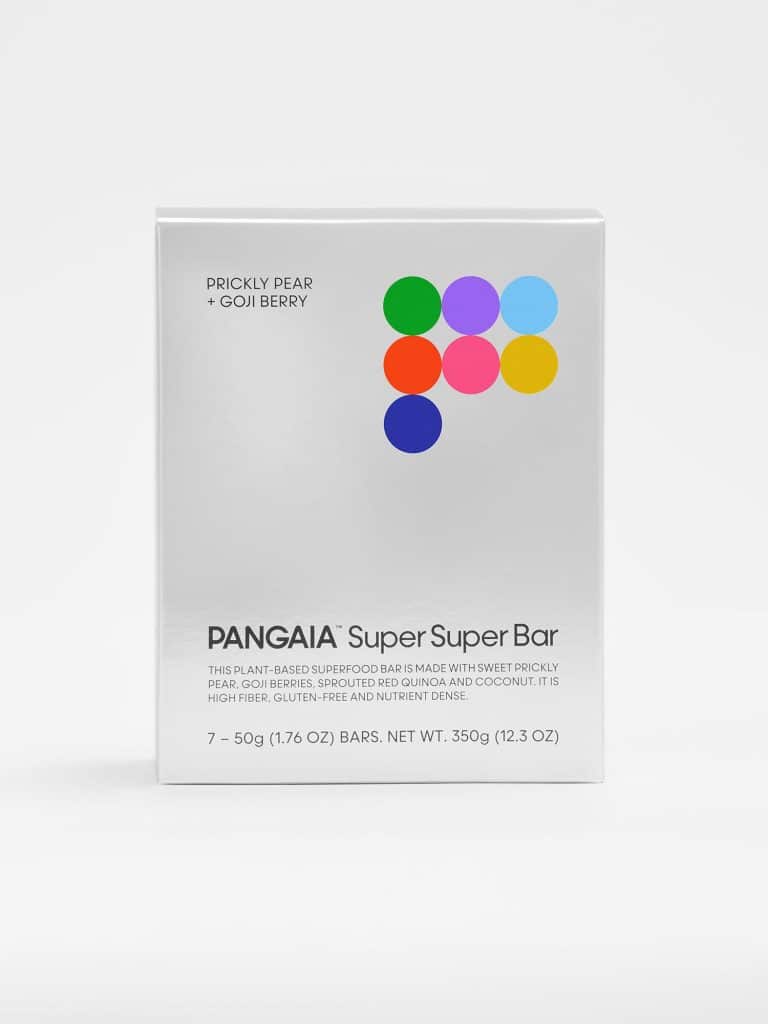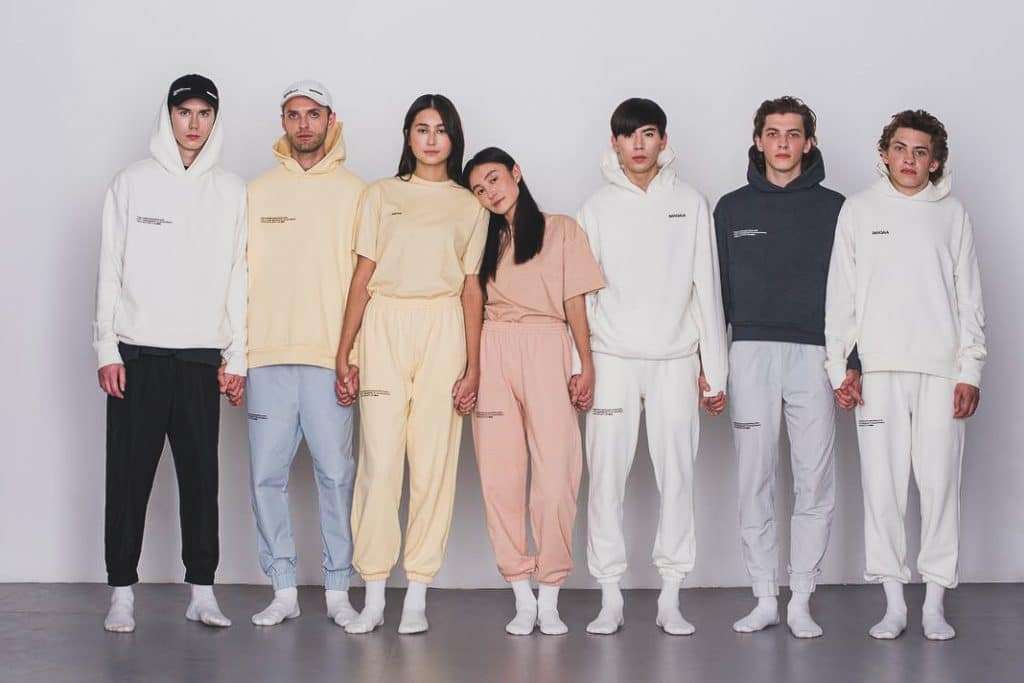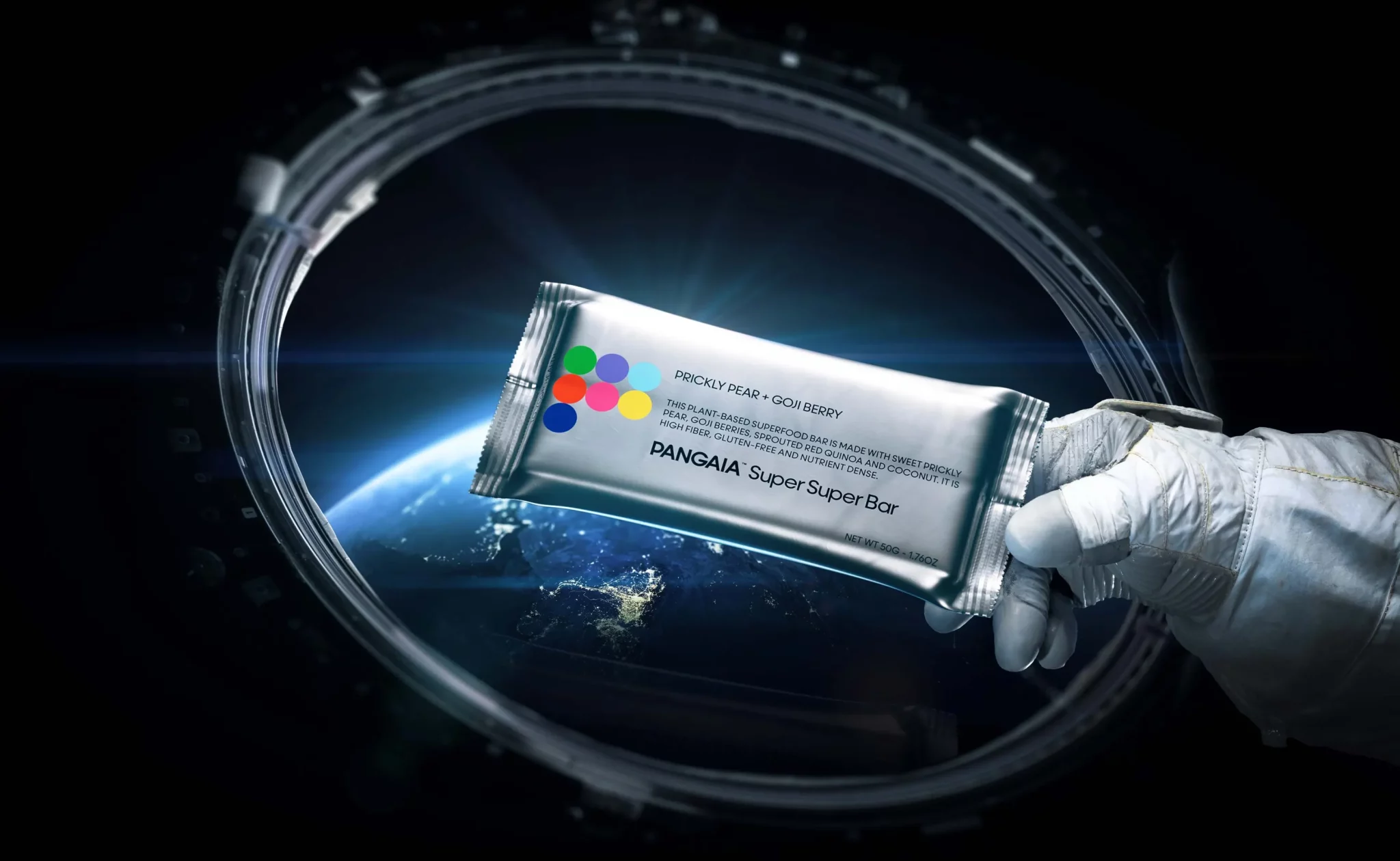Materials science label Pangaia is expanding its sustainable tech to the food category with the launch of superfood-based energy bars.
Pangaia, the materials science company that bills itself as a global collective wants to build an “earth positive” business. The U.K.-based brand is well on its way. It has taken an innovative approach to fashion, operating like a decentralized group “of one heart and many hands” that includes scientists, technologists, and designers all working to innovate and improve on the fashion industry’s large carbon footprint. Now, it’s aiming to do the same for food.
On the heels of its North American launch with pop-up shops at Nordstrom’s in February, the brand has announced its expansion into the food category with the launch of Pangaia Superfoods.
Pangaia Superfoods
“This launch marks a key moment for the food industry, combining bio-tech, food science, nature, and functional nutrition into convenient and highly delicious products that are carbon neutral. Shepherding Pangaia into this new category of CPG is industry veteran Ira Laufer, who has been architecting this new division for Pangaia since 2021,” the brand said in a statement.
The new Super Super Bars feature a range of superfoods developed by its team of scientists, farmers, nutritionists, and culinary leaders aimed at having a decreased impact on the planet. The first on offer is the Prickly Pear and Goji Berry Super Super Bar. It contains the nutrient-rich prickly pear and goji berries as well as sprouted quinoa and Meltec fiber—a proprietary blend that’s made from upcycled ingredients.

The bars are certified carbon neutral, offset through investments into clean energy projects. And each box sold supports bees through a ten square foot flower planting, the company says. This through the Bee the Change fund that supports bumblebee reintroduction projects, pollinator survival, and supports sustainable farming and ecosystem restoration.
If launching food seems like a disconnect for a fashion brand, Pangaia Health CEO Ira Laufer says otherwise.
“Pangaia was born to bring breakthrough materials science innovations into the world and there is no limit to material science innovation,” he told Ethos via email.
“We are creating functional superfood products developed, tested and born through the same Pangaia lens of bringing breakthrough problem solving science and innovation to the superfood category. Food is a vehicle to deliver materials science and biotech innovations.”
It’s not the first brand to make a leap into food out of fashion. Outdoor clothing and gear giant Patagonia did it with its Patagonia Provisions for many of the same reasons. The certified B Corp saw an opportunity to bring its environmental commitments to food and beer.
Dr. Bronner’s, the iconic vegan soap manufacturer launched its own range of Fair Trade chocolate to support many of the farmers already in its value chain.
‘High-tech naturalism’
For Pangaia, food extends to its materials philosophy of high-tech naturalism. That means using nature to expand and improve on textiles and materials.
“We’re looking for places where there is an abundance in nature and combine that with the latest technology, to optimize and augment the very best of nature in a very high-tech approach. We use this same philosophy for every ingredient that goes into Superfoods,” Laufer says.
“Superfoods” is not a verified term despite its wide use in the health space. The general consensus though is that it applies to foods where the nutritional benefits are greater than the caloric value; most fruits and vegetables fall into this category as do some grains and beans. Unprocessed, whole plant-based foods contain high levels of antioxidants and other nutrients that bring a host of health benefits.
Pangaia says that’s only part of the reason it entered into the space. Many of these superfoods also carry a lower environmental impact, making them not only better for human health, but better for the planet, too.

“Nature gives us the ingredients for the food we eat and the clothes we wear,” Laufer says. “We look to source the best ingredients and protect biodiversity and the planet.”
Last month, the brand partnered with mycelium-based materials brand Ecovative to explore mushroom-based leather. Like Pangaia, Ecovative has a food-based offshoot, MyForest Foods. Its first product is vegan mushroom-based bacon.
Laufer says Pangaia is looking for ingredients that support planetary health as food harvesting has a “massive impact” on the planet. “We are exploring a range of products that use innovative ingredients, including plant-based innovations,” he says.
“Our goal is to constantly push boundaries with innovation, sustainability, functional wellness and incredible taste through all our products,” says Laufer. “Super Super bars are our first product within our Superfoods category—and this is only the beginning.”
The bars are currently available online and at limited-edition pop-ups slated for 2022, but Pangaia is looking at conventional retail distribution opportunities for the future.


